The impact of the refugee crisis on world politics and society

I. Introduction
The world has entered the 21st century, with advanced science and technology and progress in civilization. Human beings are scattered all over the world like a global village, and people can travel thousands of miles in one day. However, we often see from the media that many refugees are "desperately" escaping to relatively safe areas and are crowded into refugee camps with terrible living conditions while waiting for resettlement.
The vast majority of refugees are forced to flee due to war, famine, disasters, religious or racial persecution; many refugee families are separated and lose their lives during the flight. The refugee flows that have broken out in recent years, mainly originating from the Middle East and Africa, are even more shocking. It is hard to believe that these tragedies are still happening every day today.
歐洲一向是住民安居樂業的地方,但從2010年底爆發「阿拉伯之春」事件後,1 為數眾多,以穆斯林為主的難民,從中東、非洲和南亞等地,經地中海及巴爾幹半島,強行進入歐盟國家尋求居留而產生的移民潮,帶給歐盟國家極大的困擾,至今還沒妥善解決。
After the Syrian civil war broke out in 2011, millions of Syrians fled abroad. Although neighboring Turkey, Lebanon and Jordan have received large numbers of refugees, many people want to live in wealthier Europe, exacerbating the flow of refugees to Europe, which peaked in 2015.
The United States has also recently been faced with people from Central and South American countries illegally entering the border through Mexico, which has also caused border tensions. Other regions, such as Africa, Australia, Bangladesh and South America, also have serious refugee problems.
There are tens of millions of refugees worldwide, which is a vast field of care. Some of our colleagues personally visited several refugee areas to interview missionaries who served during the period. It was touching to witness the missionaries caring for the refugees and preaching the gospel to them. (See related outreach articles in this issue.)
This article intends to give a brief introduction to the refugee issue so that readers can understand the refugee issue. And explore how Christians can participate in the ministry of caring for and assisting refugees, especially in preaching the gospel to the suffering people. Due to the complexity of the refugee issue, we plan to publish it in separate chapters. This article focuses on the impact of the refugee crisis on the politics and society of various countries, especially Europe.
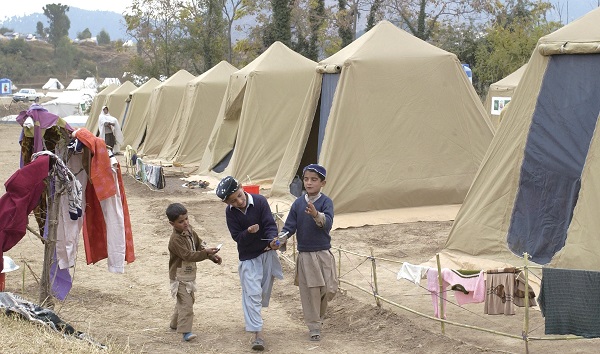
▲The vast majority of refugees are forced into exile due to war, disaster, racial or religious persecution. Pictured is a refugee camp in Pakistan.
(Image source:pixabay.com/photos/shinkiari-pakistan-camp-tents-81770/)
2. The history of refugee affairs
Refugees are a type of immigrants who are forced to move or even give up their nationality due to some irresistible reasons, such as war, natural disasters, etc. Refugee issues have existed since ancient times. For example, in Chinese history, every time there was a change of dynasty, war, famine, or river flooding, there would be a wave of refugees.
While most refugees historically have fled war, other issues have also contributed to the refugee crisis. "Persecution" is one of the most common reasons and can take many forms: religious, social, ethnic, racial and political persecution, etc.
Extreme poverty and famine are another factor causing refugees. For example, in 2017, the Horn of Africa Peninsula in northeastern Africa, Nigeria, and Yemen in the Middle East were hit by severe drought, escalating riots, and insufficient financial aid, resulting in food shortages. Seriously, 4 million refugees in these areas are at risk of starvation. In February 2017, 100,000 people in South Sudan were about to starve to death, and 1 million people faced famine. 1.7 million people from South Sudan have fled to Uganda, 63% of whom are children. 22
International organizations caring for refugees
In international affairs, the term "refugee" began to be recognized only after World War I. The League of Nations established the High Commission for Refugees in 1921, which was the first international coordination organization on refugee affairs.
In 1921, Lenin canceled the citizenship of all Russian expatriates who fled abroad (especially those of Belarusian race). About 800,000 Russian refugees became stateless, and they were resettled by this agency.
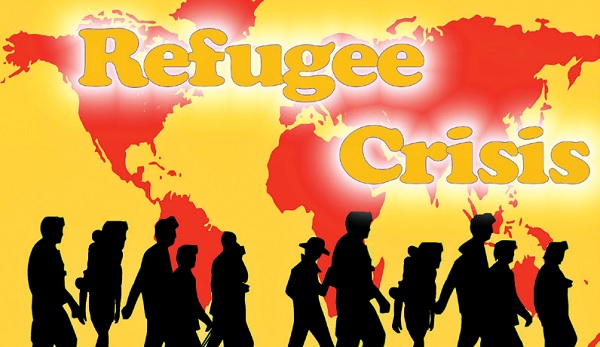
▲The wave of refugees that has erupted in recent years, mainly originating from the Middle East and Africa, is shocking.
(Image source: https://pixabay.com/illustrations/map-of-the-world-human-group-1005416/)
After the rise of Nazism in Germany, many refugees fled Germany, and this agency was responsible for handling them. Later, the agency expanded its responsibilities to include refugees from other countries.
During World War II, more refugees emerged internationally, especially Jews who were persecuted by the German Nazis and fled all over the world. Therefore, the Allies established the United Nations Relief and Rehabilitation Administration (UNRRA) in 1943, 1945- After 46 years, its functions were transferred to the United Nations Refugee Agency and the World Health Organization.
With the dissolution of the League of Nations, the end of World War II, and the establishment of the United Nations, the refugee issues arising from World War II began to receive attention again.
The United Nations established the "Office of the United Nations High Commissioner for Refugees—UNHCR" ("UNHCR") on December 14, 1950, with its headquarters in Geneva, Switzerland, replacing the United Nations Relief and Relief Administration. , is a United Nations agency responsible for protecting and supporting refugees. Its purpose is to lead and coordinate international actions to protect refugees and solve refugee problems worldwide. UNHCR provides assistance to local refugees at the request of local governments or the United Nations itself.
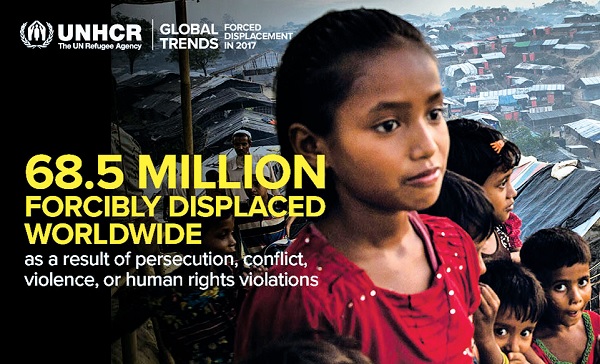
▲There are tens of millions of refugees worldwide, which is a vast field of care. The picture shows the refugee information page provided by the United Nations High Commissioner for Refugees.
(Image source: https://www.unhcr.org/global-trends-2017-media.html)
The United Nations also has a second refugee office, the United Nations Relief and Works Agency for Palestine Refugees in the Near East, which is specifically responsible for supporting Palestinian refugees (UNRWA, the United Nations Relief and Works Agency for Palestine Refugees in the Near East, established in December 1949).
UNHCR works to ensure that everyone has the right to seek asylum and to receive safe haven in another country or, where circumstances permit, to voluntarily return to their place of origin, integrate locally or be resettled in a third country. For its pioneering work in helping European refugees and its assistance to refugees around the world, UNHCR won the Nobel Peace Prize in 1954 and 1981.
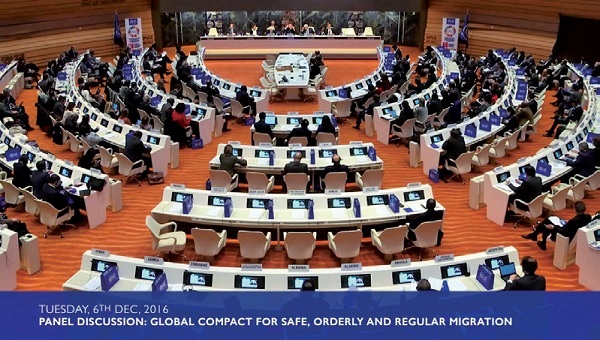
▲On December 17, 2018, the United Nations adopted the historic Global Compact on Refugees. (Image source: UN WEBTV)
United Nations Convention Relating to the Status of Refugees
The United Nations Convention on the Status of Refugees was adopted on July 18, 1951. The definition of a refugee is not limited to Europe, but covers the entire world.
In 1956, UNHCR was involved in coordinating the uprising that broke out in Hungary. A year later, the UNHCR was involved in solving the problem of a large number of Chinese refugees moving into Hong Kong. It also needed to deal with refugees who fled to Morocco and Tunisia due to the Algerian War of Independence. UNHCR’s mission has gradually expanded in recent years to include providing humanitarian assistance to a variety of refugees, such as internally displaced persons with refugee characteristics as described in the Convention on the Status of Refugees. Its main working locations are Africa, the Middle East and Central Asia, among which Lebanon, South Sudan, Chad, the Democratic Republic of the Congo, Iraq, Afghanistan and Kenya have the most affairs.
After entering the 21st century, a new wave of nationalism and populism broke out in various places, causing many countries to refuse to accept refugees, which made the situation of UNHCR even worse. The United Nations designated June 20 each year as World Refugee Day at the end of 2000 to commemorate the 50th anniversary of the entry into force of the Convention on the Status of Refugees and to draw global attention to refugee issues and provide humanitarian assistance.
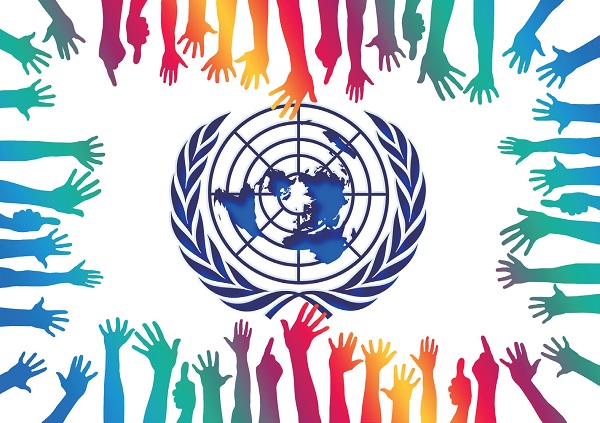
▲The world's refugee problems are complex. The United Nations established the International Refugee Agency with the purpose of leading and coordinating, protecting refugees and solving refugee problems.
(Image source:pixabay.com/illustrations/access-many-hands-un-world-933122/)
The Global Compact on Refugees
Through the efforts of the United Nations High Commissioner for Refugees and international countries and groups that attach great importance to refugee issues, the United Nations adopted the historic Global Refugee Compact on December 17, 2018, aiming to change the way countries around the world deal with large-scale displacement and refugee crises. approach that benefits both refugees and the countries and communities that host them, and looks forward to the commitment of all countries to respond to the refugee crisis more effectively and equitably.
The background to this pact is that in the past, countries near crisis areas have hosted the vast majority of the world's refugees, despite often facing economic problems of their own.
However, in recent years, contrary to international refugee conventions and human rights laws, many countries have adopted border closure measures to prevent the influx of refugees, leaving millions of refugees facing the plight of displacement or risking their lives to face an uncertain future.
The new compact expects: States to fully commit to strengthening and shouldering the responsibilities of the global village (represented by the United Nations High Commissioner for Refugees) towards refugees; to find solutions that respect the human rights of refugees; to give them hope; and to recognize their legal responsibility to protect and support them. .
任何國家都不應該單獨應付大量難民湧入。難民危機需要全球各國共同承擔責任,而《全球難民契約》則是如何在當今分裂的世界中各國通力合作的有力依據。3 該契約的四個關鍵目標是;減輕收容國的壓力:加強難民自力更生:擴大獲得第三國解決辦法的機會:及支援原籍國安全和體面地返回的條件。4
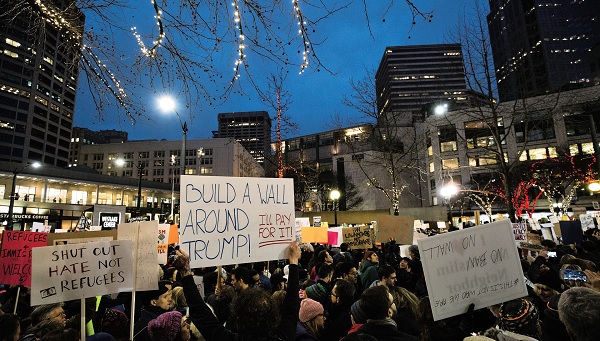
▲Immigration regulations in various countries handle refugee issues in different ways.
(Image source: https://pixabay.com/photos/people-man-woman-protest-rally-2582774/)
3. Definition and demographics of refugees
There is a difference between refugees and immigrants
Refugees are a type of immigrant, people who are unable to safely return to their homeland and seek protection from dangerous situations. The term "refugees" has a specific legal background and does not apply to all immigrants.
According to Article 1 of the Convention on the Status of Refugees, a refugee is someone who is outside the territory of his or her country of origin and is unwilling or unable to return due to well-founded fear of persecution because of race, religion, nationality, membership of a special social group or political opinion. country of origin or persons protected by that country.
There are two main principles that establish the protection of refugees under international law, namely the "principle of non-refoulement" and the "principle of international solidarity and cooperation."
The former requires that, unless there are legitimate reasons to believe that the refugee is in other serious circumstances that endanger the security of the country where he or she is located, no country shall expel or return the refugee in any way to the territorial border where his or her life or freedom is threatened.
The latter requires that all countries in the world have the responsibility to strengthen solidarity and cooperation in the admission, resettlement, assistance and sharing of expenditures on refugee protection matters, as well as in eliminating and reducing the root causes of refugees.
Although the immigration laws of various countries handle refugee issues in different ways, in most cases, "repatriation to the place of origin" or "political asylum" will be granted depending on the situation. Because disguising themselves as refugees and applying for asylum in the destination country is one of the common methods used by illegal immigrants to evade immigration review, some countries have taken corresponding measures to prevent such immigrants. For example, Canada announced a safe list of 35 countries (the United States, the United Kingdom, Japan, Mexico, Israel, etc.) between 2012 and 2013. For those included in the safe list, the Canadian government will initiate a rapid review and approval process to decide whether to accept it. In January 2016, the German ruling coalition announced that Algeria, Morocco, and Tunisia would be included in the list of "original safe countries"; it stated that refugee applications submitted to Germany by nationals of these three North African countries would likely be rejected. 55
Refugee Population - World Trend Statistics
聯合國難民署2018年6月公佈2017年度《全球趨勢報告》(Global Trends, Forced Displacement in 2017),6 指出,在過去十年期間(2007-2017),全世界被迫流離失所(total number of forcibly displaced persons)的人口大幅增加,從2007年的 4,270萬達到2017的6,850萬的新高(相當於世界總人口中每1000人即有一位流離失所者)。在這10年間,每年平均增幅4.8%。其中有1,620萬人於2017年內被迫成為流離失所者(相當於每天44,000人逃離家園)(見圖1)。
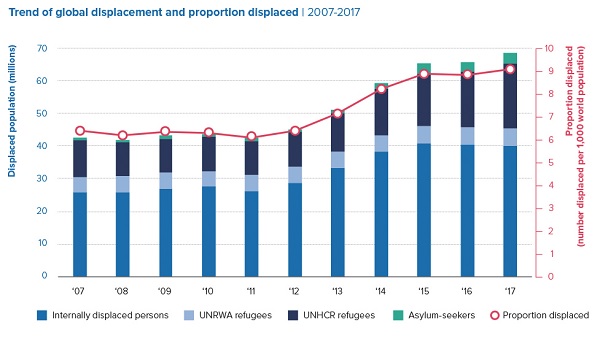
War, violence and persecution around the world, including the crisis in the Democratic Republic of the Congo, the war in South Sudan, the conflict in Syria, and the massive displacement of people in countries such as Burundi, the Central African Republic, Iraq, Ukraine and Yemen, as well as the hundreds of thousands from The flow of Rohingya refugees from Myanmar to Bangladesh has caused the number of forced displacements worldwide to continue to increase for the fifth consecutive year in 2017, although the increase is smaller than in previous years. The increase in the total number of refugees worldwide has made the crisis increasingly severe, and the short-term impact on developing countries due to hosting or generating refugees is quite severe.
The 2017 count included 39.12 million internally displaced people (down slightly from 40.3 million in 2016) and 25.4 million refugees as defined by UNHCR (an increase of 2.9 million from 2016, the single year UNHCR counted). The largest increase), of which 19.94 million (78.5% in total) are under the care of UNHCR: the other 5.4 million (21.5%) Palestine refugees are under the care of the Palestine Refugee Relief Agency for the Near East. In addition, there are 3.09 million asylum seekers and 2.8 million stateless persons.
聯合國難民署照顧的上述1,994萬難民中,85%被安置在發展中國家。而其中68%(1,345萬)來自五個國家:敘利亞(629萬)、阿富汗(262萬)、南蘇丹(244萬),緬甸(111萬),及索瑪利亞(99萬)。其中63.1%(1,259萬)留置在收容難民最多的10個國家,分別是土耳其(348萬)、巴基斯坦 (139萬)、烏干達(135萬)、黎巴嫩 (100萬)、伊朗(98萬)、德國(97萬)、孟加拉(93萬)、及蘇丹(91萬)、衣索匹亞(89萬)及約旦(69萬)。這些國家中,土耳其連續四年收容難民最多,其中只有德國是發達國家。7 圖2顯示2017年主要國家新難民逃亡路線,最多的是南蘇丹有1百萬人主要逃到蘇丹(48萬)及烏干達(46萬);敘利亞74萬5千人主要逃到土耳其(68萬1千):緬甸65萬6千全數逃到孟加拉。
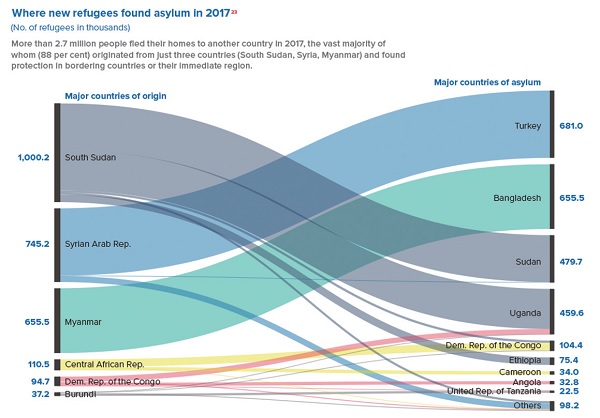
By region, Africa remains the place with the largest number of refugees. The main distribution of refugees is as follows (unit: 10,000, and percentage of the total): Sub-Saharan Africa, 623.6 (31.3%): Europe and North Asia, 608.8 (30.6%): South Asia /East Asia and Australia (South/East Asia and Oceania), 415.3 (20.9%): West Asia and North Africa (West Asia and North Africa), 265.3 (12.9%): North/South Americas (North/South Americas), 48.4 (2.4%) ). Figure 3 shows the global refugee distribution map. The larger the size of the sphere, the larger the refugee population. For example, Turkey hosts the largest number of refugees.
The above shocking figures are based on statistics from the United Nations Refugee Agency (which is assisted by the UN Refugee Agency). However, the statistics published by various governments are often higher than those of the United Nations Refugee Agency because national governments are better able to understand the flow of refugees. Regardless of where the statistics come from, the refugee population is large. In conjunction, many people mistakenly believe that most of the world’s refugees go to rich countries, with the United States and many European countries hosting the largest number of refugees. In fact, the majority of refugees in the world live in poor or middle-income countries, that is, more than 80% of refugees receive asylum in developing countries.
Türkiye, Pakistan and Lebanon sheltered the highest number of refugees in 2017. Secondly, more than half of the refugees are young people and children under the age of 18; many of these children are separated from their parents and must fend for themselves and even deal with their own legal cases.
UNHCR conservatively estimates that in 2017, a total of 45,500 unaccompanied or separated children applied for asylum as individuals in 67 countries, and 138,700 refugees and asylum seekers were processed by UNHCR for resettlement. 88
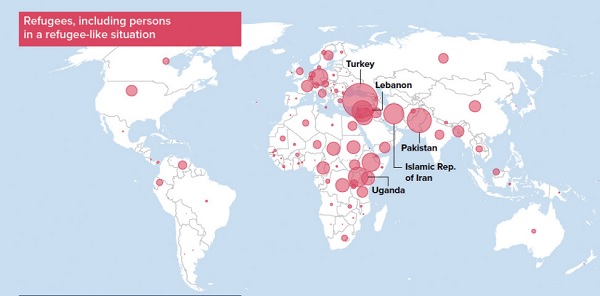
4. The European refugee crisis and its impact on European politics and society
The refugee crisis will inevitably impact the politics, society and economy of host countries, especially Europe, Africa, Turkey, the Middle East, South America (Venezuela), Bangladesh and Australia. Although Europe does not host the largest refugee population, Europe's economic conditions are much better than those of developing countries, so it naturally attracts many refugees. Of course, it will receive the attention of international mainstream media, mainly European and American countries, and it also makes Europe the most affected country in the refugee crisis. Attention area. The following analyzes the refugee crisis in Europe and its impact on Europe.
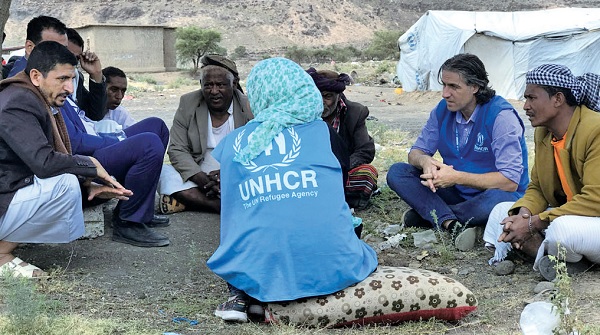
▲The refugee crisis will inevitably impact the politics, society and economy of the host country. The picture shows UNHCR staff talking to refugees.
The impact of the refugee crisis on European politics
Many countries and politicians in the EU have severely criticized the EU's refugee policy, believing that the EU's long-term policy of free movement of people and open borders has seriously affected Europe's national security, leading to the infiltration of Islamic terrorism and the promoters of Sharia law, and leading to the rise of right-wing populism. However, some observers believe that the influx of refugees will not become a financial burden on the host country, and that the refugees will have a positive impact on the country's macroeconomics after they become permanent residents. 99
The refugee crisis is even more troublesome for Germany, which hosts the largest number of refugees among developed countries. When faced with the continuous influx of large numbers of refugees via land and sea in 2015, German politics and society were unprepared. Germany's original position on accepting refugees was that only a unified EU policy could cope with the coming wave of immigrants. However, it later evolved into almost single-handedly shouldering the burden of the refugee crisis.
German Chancellor Angela Merkel stated on August 31, 2015 that she was willing to accept refugees who came to Germany via the Balkan route. She said it was "the task of the country" to accept these refugees and stressed: "We can do it!"
This move encouraged a steady influx of refugees, and neighboring countries took the opportunity to "beggar their neighbors." For example, Austria and Hungary immediately began using special buses to transport refugees to Germany. The flow of refugees began to cause unrest in Germany's domestic political situation and society, and even led to many attacks on refugee shelters. German Chancellor Angela Merkel still insists on her moral courage and declared: "Closing the country and doing nothing is not the solution to problems in the 21st century." However, her persistence has brought about changes in the political situation in Germany and also caused political unrest in many countries.
In March 2016, Germany's right-wing populist Alternative for Germany (Alternative for Germany, Alternative für Deutschland, AfD) achieved record-breaking vote rates in parliamentary elections in several federal states. Two years later, the party became the largest opposition party in the Bundestag. Within the German Christian Democratic Union camp led by Merkel, criticism of Merkel is also growing.
Merkel herself could not resist the pressure and criticized herself, saying, "What happened in 2015 will not be allowed to happen again." However, she also emphasized that Germany should be proud of its success in dealing with serious humanitarian challenges. Many countries and politicians have criticized the refugee policy represented by Merkel, believing that such policies have caused the rise of right-wing populism.
Merkel served as chairman of the Christian Democratic Union from 2000 to 2018 and became prime minister in 2005. However, she announced at the end of October 2018 that her position as prime minister would be until 2021 and she would no longer seek re-election. This was also affected by the refugee policy.
The EU Summit in June 2018 also believed that the refugee issue is the main reason that divides EU countries. EU members in southern Europe such as Italy and Greece have complained that other EU countries have stood aside and allowed them to deal with the refugee problem alone. Other EU countries countered that these southern member states did not patrol the Mediterranean Sea to intercept refugees in the past, and even allowed these refugees to successfully reach wealthier European countries such as Germany, Austria and Sweden.
The new Eastern European members, mainly located in the east of the EU, also complained that when they joined the EU, they did not agree with the EU's "everyone for one, one for everyone" concept. Therefore, when Germany and Italy asked them to lend a helping hand, they resolutely refused. reject. Fortunately, the number of new arrivals of refugees and immigrants in Europe has been declining steadily for three consecutive years. In March 2019, it was currently about 10% at the peak of the refugee flow in 2015. 1010
In order to "persuade" countries to accept refugees, the European Commission proposed in July 2018 to provide a series of financial incentives to member states that voluntarily accept refugees to promote member states to jointly share the pressure of refugees. One of the incentives is that each member state will receive a subsidy of 6,000 euros for each refugee it accepts. Although the EU continues to increase financial subsidies in the hope of temporarily alleviating the refugee crisis, the actual situation has achieved little effect. Refugees are still pouring in in large numbers, making refugee camps in many countries overcrowded and unable to load. For example, one of the five refugee camps in Greece can only accommodate 3,100 people. However, Greek official data released in September 2018 showed that 8,800 people were already living in the camp. Another refugee camp had a capacity of 650 people, but an influx of 4,000 people. .
As countries such as Greece and Italy continue to strengthen prevention and control of illegal immigration and block the smuggling of large numbers of refugees, Spain, surrounded by sea on three sides, has become the main gateway for refugees and illegal immigrants to enter Europe. Information recently released by the International Organization for Migration shows that as of September 9, 2018, nearly 74,000 illegal immigrants had poured into Europe by sea that year. Among them, about 32,000 illegal immigrants landed in Spain, accounting for 43% of the total.
Facing domestic pressure, countries are becoming increasingly tough on the influx of refugees. The Italian government continues to adopt austerity policies; the Spanish government's loose and humanitarian attitude towards refugees was initially supported by domestic public opinion. However, as the number of refugees grows, not only its policies Accused by the opposition parties and increasing pressure from the public and public opinion, the Spanish government's attitude towards the refugee issue has also changed.
Within the EU member states, observers believe that if the traditional mainstream political parties cannot handle the refugee problem well and cannot come up with effective solutions, European politics will accelerate towards right-wing populism. 1111
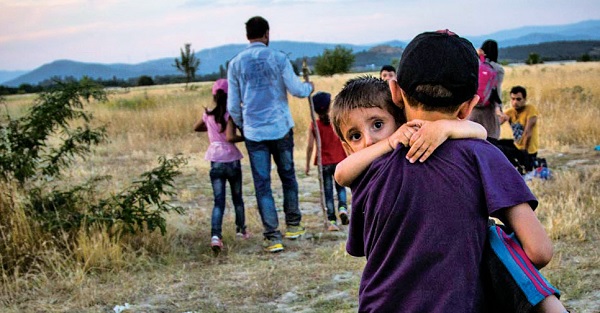
▲The influx of European refugees has brought many social, political and economic problems to EU countries.
(Image source: https://www.unrefugees.org/media/1509/europe-refugee-crisis)
The impact of the refugee crisis on European society
Attacks on refugees.對日益湧入的穆斯林難民,歐洲人普遍憂心忡忡。2017年1月的調查—歐洲人怎麼看穆斯林移民?平均有55%的受訪者同意應該停止接收更多來自穆斯林國家的移民。12許多國家發生攻擊穆斯林清真寺的事件。
In the past few years, there have been anti-Muslim or attacks on mosques in Germany. There were 3,500 incidents in 2016, 950 in 2017, and 813 in 2018. However, the number of people injured in attacks increased from 32 in 2017 to 54 in 2018. 1313
Similar attacks have also occurred in countries such as Greece and Italy, and many attacks have also occurred on Venezuelan refugees in Ecuador and South Sudan.
Neo-Nazism is currently emerging in many countries around the world, including far-right organizations such as nationalism, anti-Semitism, ultra-nationalism, and racism. They harassed refugees and caused trouble everywhere, causing social unrest and fear among refugees. 1414
Derive illegal activities.In addition to the smuggling syndicates that recruit and assist people who intend to live in Europe to smuggle people into Europe and make profits from it, forging Syrian identity documents or obtaining real Syrian passports for non-Syrians has also become an emerging business. There are reports that it only costs US$250 to obtain a fake Syrian passport and false identification documents, and even a real passport only costs US$2,500. Europol estimates that smuggling groups made a total of 6 billion euros in 2015, most of which came from arranging immigrants to enter Europe illegally, making people smuggling "the fastest-growing criminal activity in Europe."
Law and order deteriorated.According to the "Schengen Agreement" within the EU, there are no border controls between member states, and people holding a valid ID card or Schengen visa from any member state can move freely within all member states.
Although free movement of people brings many conveniences to residents and visitors of EU member states, it also brings security problems. In some countries, like Switzerland, security trends have deteriorated since joining the treaty. At the same time, the European refugee crisis has also brought new challenges to the free movement of the population, causing Germany, France, Belgium and others to suspend Schengen.
The German Federal Criminal Police Office's report on crimes with immigrant background found that immigrants accounted for 16.6% of theft crimes, 10% of fraud crimes, 11% of violent crimes, 7.6% of drug crimes, 9.1% of sex crimes and 15% of life-threatening crimes. In 2016 alone, immigration crimes increased by 52.7%. The proportion of sex crimes in which at least one suspect was an immigrant increased from 1.8% in 2012 to 9.1% in 2016.
Preview for next issue: How to resettle refugees? Completely solve the causes of refugees? What impact do refugees have on the economies of host countries? How can Christians help refugees?
"When he (Jesus) saw the great crowds, he had compassion on them: because they were wretched and homeless, like sheep without a shepherd. Then he said to his disciples, The harvest is plentiful, but the laborers are few. Therefore ask the Lord of the harvest to send you The workers go out into his harvest” (Matthew 9:36-38).
1. The Arab Spring is what the Western mainstream media calls a revolutionary wave in the Arab world. Since the pro-democracy movement broke out in some towns in Tunisia in December 2010, people in some Arab countries have taken to the streets to demand the overthrow of their country's authoritarian regimes, and optimistically assumed that "a new Middle East is about to be born" as the prospect of this movement. This "Arab Spring" belongs to "a younger generation that is savvy with the Internet and demands basic democratic rights like much of the rest of the world." However, the fate of various Muslim countries is not the same, which casts a shadow on this democratization movement that has spread to many countries. As of July 2016, Tunisia was the only country to achieve democratic transition during the Arab Spring. In addition to the extremist terrorist organization Islamic State (ISIS), which took advantage of the chaos and took control of large areas, many other countries have fallen into long-term turmoil and war, triggering a European immigration crisis known as the "Arab Winter." (Wikipedia)
2. https://www.unrefugees.org/news/refugees-at-risk-of-starvation-in-africa-and-yemen/
3. https://news.un.org/zh/story/2018/12/1025001
4. https://www.unhcr.org/the-global-compact-on-refugees.html
5. https://zh.wikipedia.org/wiki/%E9%9A%BE%E6%B0%91
6. https://www.unhcr.org/en-us/statistics/unhcrstats/5b27be547/unhcr-global-trends-2017.html
7. According to Global Trends 2017: Table of Contents for the Excel Annex tables, there are some discrepancies between the figures and the details announced by UNHCR.
8. https://www.unhcr.org/globaltrends2017/
9. Will the refugee flow in Europe become a catalyst for the collapse of the European Union? 6/28/2018 https://www.bbc.com/zhongwen/trad/world-44640897
10. The Refugee Brief – 7 March 2019. WHAT YOU NEED TO KNOW https://www.unhcr.org/refugeebrief/latest-issues/
11. http://www.xinhuanet.com/world/2018-09/15/c_129953817.htm
12. https://www.newsdeeply.com/refugees/community/2017/03/28/social-impact-of-migration-must-be-a-topic-of-policy-not-fear. On refugee camps exceeding capacity, see also https://www.asylumineurope.org/reports/country/greece/reception-conditions/housing/conditions-reception-facilities, and https://www.dw.com/en/ overcrowded-refugee-camps-greek-islands/a-46771466
13. https://www.infomigrants.net/en/post/16056/germany-sees-fewer-attacks-on-muslims-and-mosques-in-2018; https://www.dw.com/en/ more-than-3500-attacks-on-refugees-in-germany-in-2016-report/a-37719365
14. Information comes from sources cited in the English and Chinese pages of Wikipedia's European Immigration Wiki. https://en.wikipedia.org/wiki/European_migrant_crisis; https://en.wikipedia.org/wiki/Neo-Nazism
 Wen Yingqian, Honorary Professor of Donghua University in Taiwan, Chairman of the Board of Directors of Kingdom of God Resources and Editor-in-Chief of the Talent Unit of Kingdom of God Magazine.
Wen Yingqian, Honorary Professor of Donghua University in Taiwan, Chairman of the Board of Directors of Kingdom of God Resources and Editor-in-Chief of the Talent Unit of Kingdom of God Magazine.
